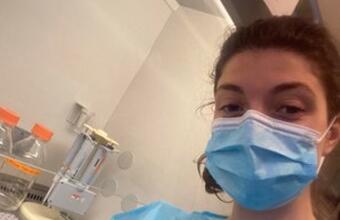
Alyssa Burrows is a burgeoning second-year Masters’ student in the Translational Medicine (TMED) Graduate program at Queen’s University. Her research is topical and essential in today’s climate as it investigates the ability for people with allergic diseases to mount an immune response to the Severe Acute Respiratory Coronavirus-2 (SARS-CoV-2), the virus that causes COVID-19. For context, Alyssa began working on this project in May 2020 before COVID-19 vaccines were made available across Canada by December 2020, and began her Master’s program in September 2021. Alyssa’s dream since she was 15 years old has been to work on such topics with Allergist Dr. Anne K. Ellis at Queen’s University. Originally from Kingston, Alyssa’s return to the town for her graduate studies also allows her to “nurture family and community relationships here.” To achieve her goal, she established herself as a published scholar and researcher, first gaining a Bachelor with Honours in Health Sciences from McMaster University specializing in Biology and Pharmacology with a certificate in Immunology, Microbiology, and Virology. She is honoured to be a trainee in the Queen’s TMED program, which she explains is a new and unique program across Canada. Compared to other university graduate programs, Alyssa says that the Queen’s TMED program offers more hands-on learning and creativity in addition to problem solving to best situate its students in their learning and future career opportunities in healthcare, medicine, and research.
Alyssa’s research differs from the typical labs in her department that research seasonal and perennial allergies using clinical models such as the Environmental Exposure Unit, which is one of 3 in Canada with only ~15 of its kind worldwide. Due to the COVID-19 pandemic, Alyssa’s work in Dr. Ellis’s team had to pivot to monitoring the asymptotic presence of COVID-19 in the Health Care Professional Student population at Queen’s. From the over 12,000 blood samples collected from this study Alyssa has measured the amount of three antibodies, IgA, IgG, IgM, which are proteins that the immune system uses to respond to threats such as viruses. They have also measured different cytokines in the blood samples, which are proteins in the immune system that provide it with instructions on how to behave. Alyssa is interested in Th2 cytokines, which are higher in people with allergic diseases such as asthma, food allergy and allergic rhinitis. People with allergic diseases have an overactive immune system, which may lead them to respond differently to COVID-19 vaccines and infection which is Alyssa’s central research question. Alyssa tests how well the antibodies from vaccinated and recovered samples work to prevent infection; to do this she partnered with Queen’s Virologist, Dr. Che Colpitts and her MSc candidate, Kim Siwak. In their lab they use viruses that are not harmful to humans and engineer them to behave like SARS-CoV-2. Alyssa’s hypothesis is that, since the human immune system is so variable in its reactions across different people, the underlying Th2 cytokine levels in allergic participants won’t affect the number of antibodies and the efficacy of said antibodies.
When not working in the lab, Alyssa is involved in her department’s graduate student society such as her role as EDI Representative in the TMED program, her participation in Food Allergy Canada, Women in Science and Engineering mentorship program, and a science communication not-for-profit group Science for Everyone. She has also worked as a representative in student government with the SGSPA to help establish a soft infrastructure that supports other student leaders and develops new traditions. She also organized a successful EDII in Medicine & Healthcare conference for which 50-60 researchers from Queen’s and other institutions attended.